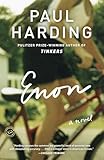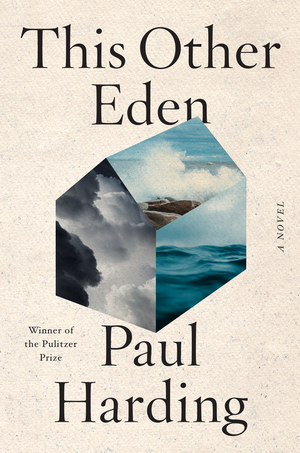In 2013, Paul Harding’s Pulitzer-Prize winning novel, Tinkers, arrived like a revelation. How did he capture the arc of his characters’ lives with such brevity and realness? Bring to life a timeless story that seems to be unfolding right now?
Four years ago, I jumped at the opportunity to work with Harding as a BookEnds fellow at Stony Brook University where he’s now the director of the MFA program in creative writing and literature. Harding inspired me with the same intelligence, curiosity, and generosity of spirit found in his books.
His new novel, This Other Eden, is based on the tragic history of a mixed-race settlement on Malaga Island, Maine, which was obliterated by mainlanders in 1911. The novel is so vividly and precisely rendered that it feels like it’s 220 pages long and 1200 pages deep—an effect Harding strives for, as he shared in our recent Zoom conversation.
During our interview, Harding sat in the quiet of his basement in front of his drum kit, a nod to his past as a professional musician.
J. Greg Phelan: In the beginning of This Other Eden, Esther Honey is sitting by the wood stove with her family in their shack struggling to survive the frigid Maine winter. She then recalls the flood which wreaked havoc on the island a century before. The juxtaposition of these harrowing scenes, one quiet and one cataclysmic, creates narrative momentum out of the gate. But it’s not linear. It’s not plot.
Paul Harding: You’re right. It’s more like a piece of music which expands and contracts, has tension and release, dissonance and harmony. You and I have talked this before—the idea of the emergence. Creating these different elements, putting them next to each other to see if they create polarities. Permutating them until they lock in something better than my conception for it. Like you’re a musician and you’re improvising. Riding a current that’s already there.
JGP: You’ve mentioned you had a more time for this novel to discover these permutations.
PH: In the case of both the first novel, Tinkers, and now this one, for various reasons, I ended up living with the books years longer than I’d planned. Of course, I was as impatient as any writer to get them published. But this time at least, as I told myself, as long as I was still with the manuscript, I’m going to keep looking at it, fiddling and calibrating. The longer you know your characters, the more precisely you can render them. I’ve learned how to just slow down and be patient.
JGP: You just keep writing with intentionality, while staying open to finding these connections.
PH: Yes, being totally open and just observe what’s unfolding. There’s a big hatch in the floor and I climb down into the world of the novel and the second I go down in there, no presumptions. I shut up, look and listen, and take notes.
In the earlier stages, whatever I’m reading, whatever paintings I’m looking at, whatever music I’ve listening to, I throw it into the book. That article I saw in Science magazine about this or that—I throw it all in, and let it simmer. Over time you realize there are things that aren’t part of this book, so you put them in the file for next time. Then proceed as if the rest does connect or will—it’s a matter of discovery.
To give one example from the novel, Ethan, the young kid who goes to paint on this estate, ends up having a love affair with a maid who lives there. I was just fooling around with their characters and their relationship. And there just happened to be this Irish lullaby that Ethan knew from like all the aunties and grandmas on his island. Then I recalled a trip I took to the Southwestern coast of Ireland, and how intrigued I’d been by Great Blasket Island, home to another island community. And so there was the point of connection—Ethan realizes the maid knows the same lullaby. They’re both island people. A little thing, that was pretty late coming.
JGP: When you discover an important connection, do you have the feeling how could I have written the book without it?
PH: Yes. How could I have not seen it? It’s right there. Every day I put in the jeweler’s loupe, trying to make each sentence exactly right. But then there are these moments I pull back and see what I actually have on my hands. What the language is doing. As you get deeper into the process, hopefully things naturally connect with each other, because you’re working with a certain repertoire of images, scenes, places, and locations. They just start to implicate themselves and it’s just delightful to watch how they do that. Yes, sometimes things blow up or collapse. But if things come together, it strikes this chord that’s beautiful.
JGP: Did it take a long time for you to get the confidence to follow this approach? Ignore the pressure to map out arcs and structures and outline your novels before you start?
PH: I don’t want to write from the outside in. I work on my rudiments, so then I can go where I want to go. I had to learn this. Come to it. It’s another emergent property—if you pay really close attention to the characters, the scenes and the situations, you will get those arcs. This is native to how narrative works, as opposed to, say, argumentation or an essay.
JGP: Your advice to write from the inside out made a big impression on me. To trust the process.
 PH: It’s natural to want to have guideposts. If outlines and writing handbooks gets you a great book, who cares. But if I had to write that way, I’d go become a plumber. It doesn’t interest me. I know what I’m into. I like lyric. I like pastoral. I tend to write in the past century. When I had to put a cell phone in my second novel, Enon, I practically had a stroke. You have this kind of like native area where your brain gets turned on.
PH: It’s natural to want to have guideposts. If outlines and writing handbooks gets you a great book, who cares. But if I had to write that way, I’d go become a plumber. It doesn’t interest me. I know what I’m into. I like lyric. I like pastoral. I tend to write in the past century. When I had to put a cell phone in my second novel, Enon, I practically had a stroke. You have this kind of like native area where your brain gets turned on.
JGP: It’s easy to be preoccupied with what you should write, rather than what you think is cool.
PH: That’s the difference between being self-conscious and self-aware. Being self-conscious, you’re thinking of some external authority saying do this or do that. Self-awareness is what I’m seeking. I’m trying to find what this story inevitably is. It doesn’t come from the outside. You write down what you think is interesting and valuable. If you’re not bored, the reader won’t be bored. That’s a bit of self-awareness, too. As I tell my students, don’t write your books for the people who won’t like them.
JGP: You once described to me your goal is to move from what you what you want the characters to say or do to finding what they would actually say or do. To have the patience to describe life experiences that are very hard to describe, literally, one step at a time.
PH: Yes. Teaching Shakespeare, I really notice it. You take any single line in Shakespeare, and it literally says what it means and means what it says. Symbolic or metaphorical meanings reverberate and suggest themselves out of constructions of literal sentences.
I wrote a scene where one of my characters is sick of housekeeping and wants to learn how to fish. All I tried to do was just create a scene in which this woman literally goes out with all this tackle and learns how to catch a flounder. But then, in juxtaposition with other scenes, a reader might start thinking, Oh, if you teach a woman to fish…. It’s fascinating how it happens.
JGP: You often combine plain-sounding words that grab you in visceral ways—for example the “saltwater guts” which consumes everything during the flood.
PH: A lot of that’s just working straight up old English. Those words are not abstract or conceptual. During a flood, people are being swallowed, so where do they end up? In the stomach or the guts. Saltwater guts, that’s literally what that is.
As I discovered with Tinkers, if I go deeper into immanence, deeper into embodiment, deeper into the senses, getting more and more precise there’s this certain point when things start feeling surreal. The words turn inside out and begin to have these figurative meanings as well.
JGP: At the end of your book, Ester, Eha, and their family having fled the island, are floating on a raft in the channel. There doesn’t seem to be any hope at all for them. Their lives on the island have been ruined. But there’s something transcendent as well.
PH: I don’t think it’s hopeless. As Flannery O’Connor once said, people without hope don’t write novels. The book has a double ending with the family on the raft and also from Eha’s point of view imagining their reunion with his son. There’s the hope. He has hope.










